【2018年考研复试英语礼貌用语模板】礼貌用语有些
英语中的礼貌用语

礼貌用语是人们在日常工作和生活交往中的一个重要部分。
它反映一个国家的文明程度和人民的文化素质。
本文将介绍一些英语礼貌用语:要求别人做某事时,通常使用下列的客气句型:Would you please ……? Would you like to ……? I wonder if you would …… Would you mind (doing)……? Would you be so kind as to ……? I would be most grateful if you……等等。
使用这些客气的表达方式,更易使对方接受。
如:1.导游要求游客跟着他走的时候说,Would you please follow me and go this way? (请大家跟我这边走好吗?)2.宴会主人安排座位时说,Mr. XXX, would you like to sit beside Ms XXX, please? (XXX 先生,请你在XXX女士旁边就座好吗?)3.主考人对参加面试的求职者可以用以下方式提问,Would you mind answering a few personal questions? (请你回答几个有关个人方面的问题,好吗?)4.请人顺便为你做些事时说,I wonder if you could do me a favour by post this letter in the post office nearby on your way home. (劳驾你是否可在回家途中到附近邮局为我寄封信。
)5.请客户尽早告诉对新产品意见时说:“As a courtesy to the next passenger, may we suggest that you clean the basin with the towel you have been using. (为照顾其他顾客,我们竭诚建议你用清洁纸把刚使用过的脸盆擦干净。
礼貌英语单词
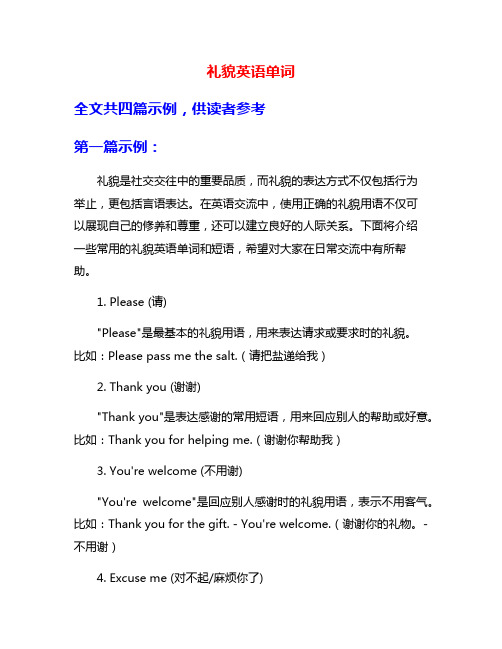
礼貌英语单词全文共四篇示例,供读者参考第一篇示例:礼貌是社交交往中的重要品质,而礼貌的表达方式不仅包括行为举止,更包括言语表达。
在英语交流中,使用正确的礼貌用语不仅可以展现自己的修养和尊重,还可以建立良好的人际关系。
下面将介绍一些常用的礼貌英语单词和短语,希望对大家在日常交流中有所帮助。
1. Please (请)"Please"是最基本的礼貌用语,用来表达请求或要求时的礼貌。
比如:Please pass me the salt.(请把盐递给我)2. Thank you (谢谢)"Thank you"是表达感谢的常用短语,用来回应别人的帮助或好意。
比如:Thank you for helping me.(谢谢你帮助我)3. You're welcome (不用谢)"You're welcome"是回应别人感谢时的礼貌用语,表示不用客气。
比如:Thank you for the gift. - You're welcome.(谢谢你的礼物。
-不用谢)4. Excuse me (对不起/麻烦你了)"Excuse me"可以用来道歉、请求别人让开或引起别人的注意。
比如:Excuse me, can I ask you a question?(不好意思,我可以问你一个问题吗?)5. I'm sorry (对不起)"I'm sorry"用来道歉或表达遗憾。
比如:I'm sorry for being late.(对不起,我迟到了)6. Pardon me (请原谅我)"Pardon me"可以用来请求别人将某事原谅或再次解释。
比如:Pardon me for my mistake.(请原谅我的错误)7. May I...? (我可以……吗?)"May I...?"是礼貌地请求别人允许的方式。
英语礼貌用语
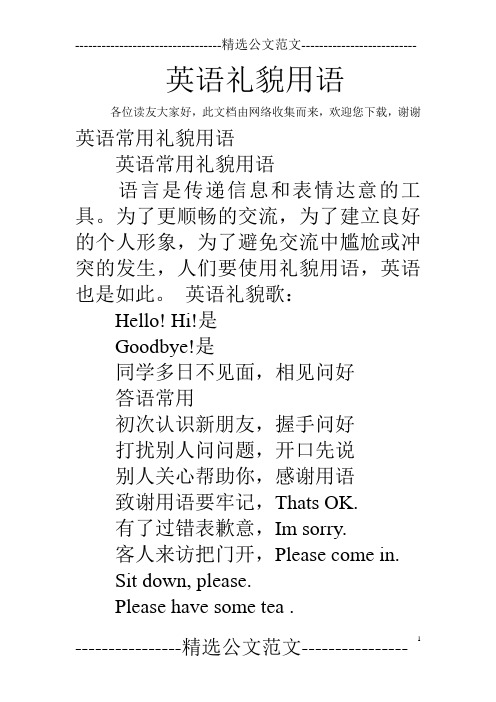
英语礼貌用语各位读友大家好,此文档由网络收集而来,欢迎您下载,谢谢英语常用礼貌用语英语常用礼貌用语语言是传递信息和表情达意的工具。
为了更顺畅的交流,为了建立良好的个人形象,为了避免交流中尴尬或冲突的发生,人们要使用礼貌用语,英语也是如此。
英语礼貌歌:Hello! Hi!是Goodbye!是同学多日不见面,相见问好答语常用初次认识新朋友,握手问好打扰别人问问题,开口先说别人关心帮助你,感谢用语致谢用语要牢记,Thats OK.有了过错表歉意,Im sorry.客人来访把门开,Please come in.Sit down, please.Please have some tea .征求意见和请求,同意许可Yes. / Sure. / Certainly. / OK!别忘了。
英文中一些常见的单词,如:thanks,hello,hi,sorry等,均属于最简单的英文礼貌用语。
交谈时对方因感冒而打喷嚏,对方会说:英文礼貌用语例句:1. I thought you were needing me, Mr. .Singer.;2. May I come in, please?;3. Every piece of luggage has to be examined through.;等等。
礼貌用语的运用:Can you pass me...? vs Give me...人们不喜欢别人支配他们去做事情,因此有时想直接得到你想要的可不是那么简单。
换掉那些听起来是命令的语句,例如Could you give me five minutes? vs Go away.你工作非常的忙,但是你的同事却请你帮忙。
当你工作非常紧张而不能做其他的事情的时候,只说Excuse me. vs Move.让别人Im afraid I cant. vs No.有时侯要拒绝一个朋友的邀请非常的困难。
只说I would like... vs I want...用下面的词表示请求常常被认为很不礼貌,Would you mind...? vs Stop it!如果有人做你不喜欢的事,而且可能还很不礼貌?你该怎样阻止他们呢?要想得到理想中的结果,不用大声叫嚣Can you hold, please? vs Wait.在电话中是否选择适当礼貌用语可以使对话更有效或中止对话。
礼貌用语65句(中英对照版)
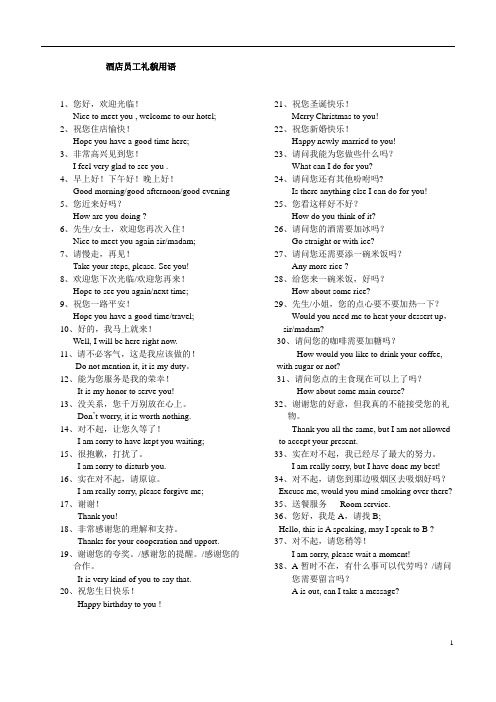
酒店员工礼貌用语1、您好,欢迎光临!Nice to meet you , welcome to our hotel;2、祝您住店愉快!Hope you have a good time here;3、非常高兴见到您!I feel very glad to see you .4、早上好!下午好!晚上好!Good morning/good afternoon/good evening 5、您近来好吗?How are you doing ?6、先生/女士,欢迎您再次入住!Nice to meet you again sir/madam;7、请慢走,再见!Take your steps, please. See you!8、欢迎您下次光临/欢迎您再来!Hope to see you again/next time;9、祝您一路平安!Hope you have a good time/travel;10、好的,我马上就来!Well, I will be here right now.11、请不必客气,这是我应该做的!Do not mention it, it is my duty。
12、能为您服务是我的荣幸!It is my honor to serve you!13、没关系,您千万别放在心上。
Don’t worry, it is worth nothing.14、对不起,让您久等了!I am sorry to have kept you waiting;15、很抱歉,打扰了。
I am sorry to disturb you.16、实在对不起,请原谅。
I am really sorry, please forgive me;17、谢谢!Thank you!18、非常感谢您的理解和支持。
Thanks for your cooperation and upport. 19、谢谢您的夸奖。
/感谢您的提醒。
/感谢您的合作。
实用的英语日常礼貌用语
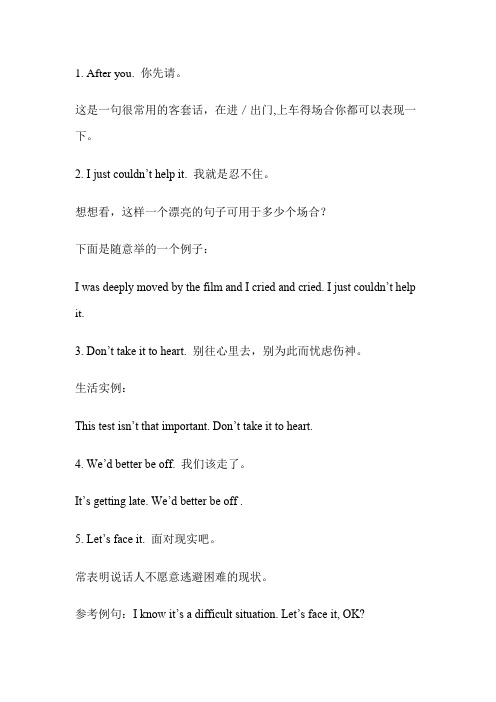
1. After you. 你先请。
这是一句很常用的客套话,在进/出门,上车得场合你都可以表现一下。
2. I just couldn’t help it. 我就是忍不住。
想想看,这样一个漂亮的句子可用于多少个场合?下面是随意举的一个例子:I was deeply moved by the film and I cried and cried. I just couldn’t help it.3. Don’t take it to heart. 别往心里去,别为此而忧虑伤神。
生活实例:This test isn’t that important. Don’t take it to heart.4. We’d better be off. 我们该走了。
It’s getting late. We’d better be off .5. Let’s face it. 面对现实吧。
常表明说话人不愿意逃避困难的现状。
参考例句:I know it’s a difficult situation. Let’s face it, OK?6. Let’s get started. 咱们开始干吧。
劝导别人时说:Don’t just talk. Let’s get started.7. I’m really dead. 我真要累死了。
坦诚自己的感受时说:After all that work, I’m really dead.8. I’ve done my best. 我已尽力了。
9. Is that so? 真是那样吗?常用在一个人听了一件事后表示惊讶、怀疑。
10. Don’t play games with me!别跟我耍花招!11. I don’t know for sure.我不确切知道。
Stranger:Could you tell me how to get to the town hall?Tom: I don’t know for sure. Maybe you could ask the policeman over there.12. I’m not going to kid you.我不是跟你开玩笑的。
英语复试时的套用语

英语复试时的套用语英语老师会根据考生开始的自我介绍,提一些有关个人生活或专业知识方面的问题。
1. 自我介绍(self-introduce) Good morning. I am glad to be here for this interview. First let me introduce myself. My name is ***, 24. I come from ******,the capital of *******Province. I graduated from the ******* department of *****University in July ,2001.In the past two years I have been prepareing for the postgraduate examination while I have been teaching *****in NO.****middle School and I was a head-teacher of a class in junior grade two.Now all my hard work has got a result since I have a chance to be interview by you . I am open-minded ,quick in thought and very fond of history.In my spare time,I have broad interests like many other youngers.I like reading books, especially those about *******.Frequently I exchange with other people by making comments in the forum on line.In addition ,during my college years,I was once a Net-bar technician.So, I have a comparative good command of network application.I am able to operate the computer well.I am skillful in searching for information in Internet.I am a football fan for years.Italian team is my favorite.Anyway,I feel great pity for our country’s team. I always believe that one will easily lag behind unless he keeps on learning .Of course, if I am given a chance to study ****** in this famous University,I will stare no effort to master a good command of advance ******.2.考研原因(reasons for my choice) There are several reasons. I have been deeply impressed by the academic atmosphere when I came here last summer. In my opinion, as one of the most famous ******in our country, it provide people with enough room to get further enrichment . This is the first reason. The second one is I am long for doing research in ******throughout my life. Its a pleasure to be with my favorite ******for lifetime. I suppose this is the most important factor in my decision. Thirdly, I learnt a lot from my *****job during the past two years. However, I think further study is still urgent for me to realize self-value. Life is precious. It is necessary to seize any chance for self-development, especially in this competitive modern world. In a word, I am looking forward to making a solid foundation for future profession after two years study here.3.研究生期间你的计划(plans in the postgraduate study)First, I hope I can form systematic view of *****. As for ******, my express wish is to get a complete comprehension of the formation and development as well as **************. If possible, I will go on with my study for doctorate degree. In a word, I am looking forward to making a solid foundation for future profession after two years study here.(简单了一些,望高手补充)4 .介绍你的家乡(about hometown)I am from Fuzhou, a famous city with a long history over 2,200 years. It is called “Rong Cheng ”because there were lots of banians even 900 years ago. The city lies in the eastern part of the province. It is the center of politics, economy and culture. Many celebrities were born here, for instance, Yanfu, Xie Bingxin, Lin Zexu and so on . . You know, there is a saying that “The greatness of a man lends a glory to a place”. I think the city really deserves it. The top three artware are Shoushan Stone, cattle-horn combs and bodiless lacquerware. In addition, it is famous for the hot springs. Theyare known for high-quality. Visitors athome and abroad feel it comfortable bathing here.There is my beloved hometown.5.你的家庭(about family) There are four members in my family; my parents, my cute cat of 9 years old and me. My father is a technician in the Fujian TV station. He often goes out on b usiness. So most of the housework is done by my industrious mom. Climbing at weekends is ourcommon interest. The fresh air and natural beauty can help us get rid of tiredness. They can strengthen our relation, too.During my prepareing for coming here,my parents’love and support have always been my power.and I hope in future I wil be able to repay them.6.你的大学(about university)**********University is the oldest one in the province. It was founded in *******and covers an area of over******* mu. The building area is ************square meters. It develops into a comprehensive university with efforts of generations, especially after the reform and opening up. It takes the lead among the *********universities with nice teaching and scientific research ability. The library has a storage of *******books. . Various research institutes are set up including 52 research centers. There are teaching research experimental bases. For example, the computer center, analyzing-test center, modern education technical center and so on.。
英语的简单礼貌用语

英语的简单礼貌用语一、称谓Madam 太太Gentleman/Mr/Sir 先生Lady 夫人、女士二、欢迎语Welcome to JITALY.欢迎您光临吉天利。
Welcome to our restaurant.欢迎您来这里进餐。
I hope you'll enjoy your stay here.希望您在这里生活愉快。
三、问候语1、Hello ! /Hi(你好)2、Nice to meet you! (见到你很高兴)Nice to meet you too! (我也很高兴见到你)3、-How do you do! 您好! -How do you do!4、Good morning.早上好。
Good afternoon.下午好Good evening.晚上好。
5、Good night! (晚安)6、Goodbye! (再见)7、See you later! (一会儿见)8、See you tomorrow! (明天见)9、How are you? (你好吗),I am fine. (我很好)10、What’s your name? (你叫什么名字)My name is XX(我叫XX) /XX四、礼貌用语1、Please (请)2、Come in, please! (请进)3、Sit it down, please!(请坐)4、-Thank you! (谢谢)-That’s all right! (不用谢) 或You are welcome! (不客气)5、Excuse me. (对不起,打扰一下)6、-I am sorry. (对不起)-Not at all. (没关系)五、答谢和答应语:1、Thank you very much.谢谢你2、Thanks for your coming.感谢您的到来。
3、Thanks a lot.多谢。
Thank you for being so understanding. 理解万岁!4、I’m sorry about this.对此我表示歉意。
英语中的常用交际套语

英语中的常用交际套语1. 礼貌用语在英语交际中,礼貌用语是必不可少的。
以下是一些常用的礼貌用语:•Excuse me(对不起,打扰了):用于在和他人交流中打断或提出请求时要先表达自己的礼貌与谦虚。
•Sorry(对不起):用于道歉。
•Thank you(谢谢):用于表示感谢。
•You are welcome(不用谢):用于回应别人的感谢。
•Please(请):用于表达自己的请求。
•May I(我可以……吗?):在要求做某事时的礼貌表达。
2. 自我介绍在交际中,自我介绍是必不可少的。
以下是一些常用的自我介绍套语:•Let me introduce myself(让我来自我介绍一下):措辞简洁、直接,适用于各种场合,比如说在面试、初次见面、开班会等。
•Hi, my name is…(你好,我叫……):表述简单明了,用于自报名字,适用于说话方和听话方之间有十分直接的人际关系的场合。
•Nice to meet you(很高兴认识你):表示对对方的尊重和礼貌,用于初次见面时。
•Pleased to meet you(很高兴见到你):和“Nice to meet you”类似。
3. 问候语在日常生活中,问候语也是必不可少的。
以下是一些常用的问候语:•Good morning(早上好):用于在早晨见面时的问候用语。
•Good afternoon(下午好):用于在下午见面时的问候用语。
•Good evening(晚上好):用于在晚上见面时的问候用语。
•How are you?(你好吗?):用于向对方问候。
尤其适用于与久违的朋友见面时。
•I’m fine, thank you. And you?(我很好,谢谢。
你呢?):用于回复对方的问候,同时表示对方的关注。
其中,I’m fine可以替换成I’m OK/I’m great等。
4. 道别语最后,让我们来看看一些英语中常用的道别语:•Goodbye(再见):最直接、常用的道别语。
英语里的礼貌用语短语

英语里的礼貌用语短语英语里的礼貌用语短语礼貌用语是指在语言交流中使用具有尊重与友好的词语。
礼貌用语是尊重他人的具体表现,是友好关系的敲门砖。
老外的礼貌用语,与我们中文表达不太一样,下面,不妨一起去学习一下,外国人的`礼貌用语短语。
In sociolinguistics and conversation analysis (CA), politeness strategies are speech acts that express concern for others and minimize threats to self-esteem ("face") in particular social contexts.在社会语言学角度与会话分析角度下,礼貌策略指的是一种在特定社会背景下表达对他人的感受且将威胁自尊(面子)降低至最小程度的说话方式。
Positive politeness strategies are intended to avoid giving offense by highlighting friendliness. These strategies include juxtaposing criticism with compliments, establishing common ground, and using jokes, nicknames, honorifics, tag questions, special discourse markers (please), and in-group jargon and slang.积极礼貌策略旨在强调友善以避免冒犯,其中包括:扬抑并举、建立共同点、笑话、昵称、敬语、附加疑问句、特殊话语标记(如:请)、圈内行话等。
Negative politeness strategies are intended to avoid giving offense by showing deference. These strategies include questioning, hedging, and presenting disagreements as opinions.消极礼貌策略旨在表示尊敬以避免冒犯,其中包括:询问、说话留余地、用提议的方式表示反对。
英语常用礼貌用语

常用礼貌用语、服务用语(1)称谓用语Madam 太太Gentleman 先生Lady 夫人、女士(2)欢迎语Welcome to our hotel.欢迎您光临我们宾馆。
Welcome to our restaurant.欢迎您来这里进餐。
I hope you'll enjoy your stay here.希望您在这里生活愉快。
(3)问候语How do you do! 您好! Good morning.早上好。
Good afternoon.下午好Good evening.晚上好。
Long time no see. How are you?多日不见,您好吗?(4)祝贺语I wish you a happy holiday! 祝您节日愉快!Merry Christmas ! 圣诞愉快!Happy New year ! 新年快乐!(5)告别语Good bye! 再见!Good night! 晚安!See you tomorrow.明天再见。
Pleasant journey! 祝您旅途愉快。
Have a good trip! 一路平安!Hope to see you again.欢迎您再来!(6)征询语。
What can I do for you? 我能为您做些什么吗?Is there anything I can do for you? 需要我帮您做些什么吗? Is there anything else? 您还有别的事情吗?Will it trouble you? 这会打扰您吗?Would you like…? 您喜欢…吗?Would you want…? 您需要…吗?Would you mind if I…? 如果您不介意的话,我可以…吗? Please speak slowly.请您讲慢点。
(7)应答语。
You are welcome.不必客气。
It’s my duty.这是我应该做的。
英语文明礼貌用语
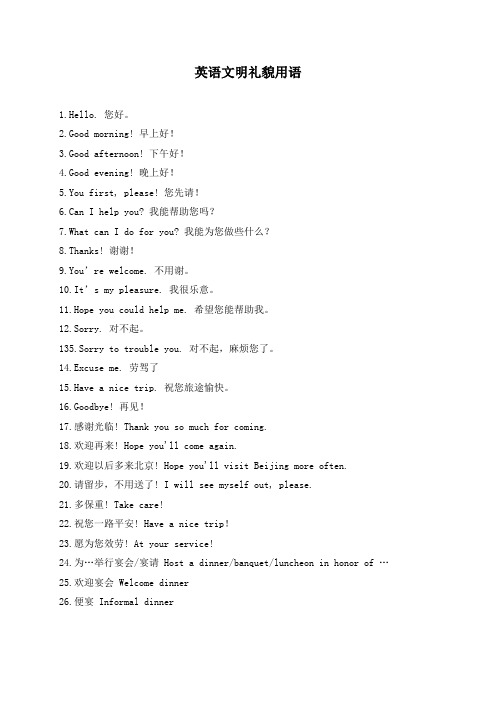
英语文明礼貌用语1.Hello. 您好。
2.Good morning! 早上好!3.Good afternoon! 下午好!4.Good evening! 晚上好!5.You first, please! 您先请!6.Can I help you? 我能帮助您吗?7.What can I do for you? 我能为您做些什么?8.Thanks! 谢谢!9.You’re welcome. 不用谢。
10.It’s my pleasure. 我很乐意。
11.Hope you could help me. 希望您能帮助我。
12.Sorry. 对不起。
135.Sorry to trouble you. 对不起,麻烦您了。
14.Excuse me. 劳驾了15.Have a nice trip. 祝您旅途愉快。
16.Goodbye! 再见!17.感谢光临! Thank you so much for coming.18.欢迎再来! Hope you'll come again.19.欢迎以后多来北京! Hope you'll visit Beijing more often.20.请留步,不用送了! I will see myself out, please.21.多保重! Take care!22.祝您一路平安! Have a nice trip!23.愿为您效劳! At your service!24.为…举行宴会/宴请Host a dinner/banquet/luncheon in honor of …25.欢迎宴会 Welcome dinner26.便宴 Informal dinner27.Can I take a rain check? 你能改天再请我吗?28.Can I take your order? 您要点菜吗?29.Can you give me a wake-up call? 你能打电话叫醒我吗?30.Can you give me some feedback? 你能给我一些建议吗?31.Can you make it? 你能来吗?32.Can I have a word with you? 我能跟你谈一谈吗?33.Catch me later. 过会儿再来找我。
礼貌用语大全英语单词
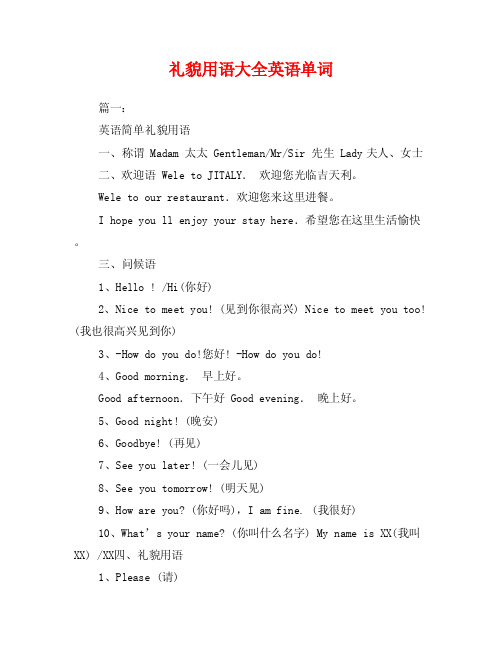
礼貌用语大全英语单词篇一:英语简单礼貌用语一、称谓M ad am太太Ge nt le ma n/Mr/S ir先生La dy夫人、女士二、欢迎语W el etoJ IT AL Y.欢迎您光临吉天利。
We let oou rre st au ra nt.欢迎您来这里进餐。
Iho pey oul len jo yyo urs ta yhe re.希望您在这里生活愉快。
三、问候语1、H el lo!/Hi(你好)2、Ni cet ome ety ou!(见到你很高兴)N ic etom ee tyo uto o!(我也很高兴见到你)3、-Ho wdoy oud o!您好!-H owd oyo udo!4、G oo dmo rn in g.早上好。
G oo daf te rn oo n.下午好Go ode ve ni ng.晚上好。
5、Go odn ig ht!(晚安)6、Go od by e!(再见)7、S eey oul at er!(一会儿见)8、Se eyo uto mo rr ow!(明天见)9、H owa rey ou?(你好吗),Iamf in e.(我很好)10、W ha t’syo urn am e?(你叫什么名字)Myn am eisX X(我叫XX)/X X四、礼貌用语1、P le as e(请)2、C om ein,pl ea se!(请进)3、Si titd ow n,p le as e!(请坐)4、-T ha nky ou!(谢谢)-Th at’sa llr ig ht!(不用谢)或Yo uar ewe le!(不客气)5、E xc us eme.(对不起,打扰一下)6、-Ia mso rr y.(对不起)-No tata ll.(没关系)五、答谢和答应语:1、T ha nky ouv er ymu ch.谢谢你2、Th an ksf ory ou rin g.感谢您的到来。
考研英语复试口语模板(精选8篇)
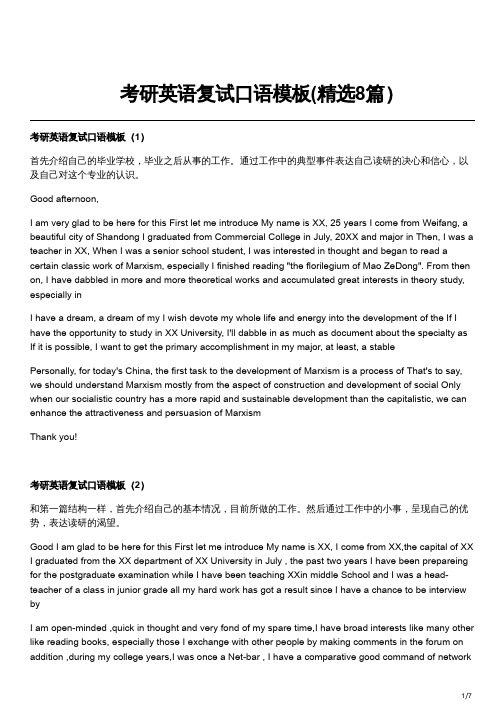
考研英语复试口语模板(精选8篇)考研英语复试口语模板(1)首先介绍自己的毕业学校,毕业之后从事的工作。
通过工作中的典型事件表达自己读研的决心和信心,以及自己对这个专业的认识。
Good afternoon,I am very glad to be here for this First let me introduce My name is XX, 25 years I come from Weifang, a beautiful city of Shandong I graduated from Commercial College in July, 20XX and major in Then, I was a teacher in XX, When I was a senior school student, I was interested in thought and began to read a certain classic work of Marxism, especially I finished reading "the florilegium of Mao ZeDong". From then on, I have dabbled in more and more theoretical works and accumulated great interests in theory study, especially inI have a dream, a dream of my I wish devote my whole life and energy into the development of the If I have the opportunity to study in XX University, I'll dabble in as much as document about the specialty as If it is possible, I want to get the primary accomplishment in my major, at least, a stablePersonally, for today's China, the first task to the development of Marxism is a process of That's to say, we should understand Marxism mostly from the aspect of construction and development of social Only when our socialistic country has a more rapid and sustainable development than the capitalistic, we can enhance the attractiveness and persuasion of MarxismThank you!考研英语复试口语模板(2)和第一篇结构一样,首先介绍自己的基本情况,目前所做的工作。
复试回答问题时礼貌用语

复试回答问题时礼貌用语1. “老师,您好呀!谢谢您给我这个复试的机会呢。
”- 那天我去参加一个绘画班的复试。
一进教室,看到老师坐在那里,我就特别开心地说:“老师,您好呀!谢谢您给我这个复试的机会呢。
”老师听了,脸上立刻露出了笑容。
旁边还有几个已经在等待复试的小朋友,他们都好奇地看着我。
有个小男孩小声嘀咕:“他可真有礼貌。
”我心里就像吃了蜜一样甜。
我觉得呀,礼貌就像一把钥匙,能打开别人心里那扇友善的门。
在生活里,只要我们有礼貌,就会让周围的人都感觉很舒服呢。
2. “考官叔叔,打扰您一下,我可以开始回答了吗?”- 我去参加学校小主持人的复试。
考场里特别安静,考官叔叔正严肃地看着我。
我有点紧张,但还是很有礼貌地说:“考官叔叔,打扰您一下,我可以开始回答了吗?”叔叔的表情一下子变得温和了些,点了点头。
我旁边的妈妈也悄悄竖起了大拇指。
这时候我就想到,礼貌就像是黑暗中的一盏小灯,能让紧张的气氛变得轻松起来。
在和别人相处的时候,一个小小的礼貌举动,可能就会改变整个氛围。
3. “尊敬的面试官,您问的这个问题我不是很明白,能不能再解释一下呀?拜托了。
”- 有一次我去参加一个机器人兴趣小组的复试。
面试官问了一个很专业的问题,我有点懵。
于是我很诚恳地说:“尊敬的面试官,您问的这个问题我不是很明白,能不能再解释一下呀?拜托了。
”面试官笑了笑,很耐心地又解释了一遍。
旁边的其他复试者都投来了羡慕的目光。
这就像在一个陌生的森林里,我迷了路,礼貌就是我向别人求助的信号。
有礼貌地寻求帮助,别人也更愿意帮助我们,这样我们就能更好地在生活这个大森林里前行。
4. “您好,老师。
如果我回答得不好,请您多多包涵呀。
”- 我参加数学竞赛复试的时候,心里很忐忑。
看到老师后,我先礼貌地打招呼:“您好,老师。
如果我回答得不好,请您多多包涵呀。
”老师微笑着说:“没关系,放轻松。
”这时候,我看到同组的一个同学皱着眉头,看起来很紧张。
我就想,礼貌就像一阵微风,能吹散别人心头的乌云。
日常礼貌用语英语

日常礼貌用语英语日常礼貌用语英语学习英语的主要目的就是为了交流,而在交流的过程中,礼貌性用语是经常会用到的。
以下是小编精心整理的日常礼貌用语英语,希望能够帮助到大家。
Hello!Hi!是"你好!",见面问好常用到。
Goodbye!是"再见!",Good night!道"晚安!"同学多日不见面,相见问好"How are you?"答语常用"I'm fine. Thank you."初次认识新朋友,握手问好"Glad to meet you."打扰别人问问题,开口先说"Excuse me."别人关心帮助你,感谢用语"Thank you."致谢用语要牢记,That's OK."没关系。
"有了过错表歉意,I'm sorry."对不起。
"客人来访把门开,Please come in."请进来。
"Sit down, please. "请坐下。
"。
Please have some tea ."请喝茶。
"征求意见和请求,"May I... ?"先开头。
同意许可Yes./ Sure. / Certainly. / OK!别忘了。
英文中一些常见的单词,如:thanks,hello,hi,sorry等,均属于最简单的英文礼貌用语。
交谈时对方因感冒而打喷嚏,对方会说:"Excuse me",而你会说:"God bless you!"来到商店,售货员会礼貌地问一句:"Can I help you, please?"。
这些都是语言礼貌原则的.体现。
人们表达礼貌的方式多种多样。
求职面试礼貌用语

求职面试礼貌用语1.面试礼貌用语口语句子:Please.请。
可用在句首或句尾。
Excuse me.打扰了。
常用在请求别人帮忙或不得不打扰别人的情境下。
也可译成“不好意思”、“劳驾”、“失陪了”等等。
Would you excuse me?打扰一下好吗?“Would you...?”句型常用来表示比较委婉的请求或建议等。
Welcome to Beijing.欢迎您到北京来。
Welcome!欢迎!Welcome home.欢迎回家。
Welcome back.欢迎回来。
After you.= You first.若要表示“女士优先”则用“Ladies first.”您先请。
Age before beauty.长者先请。
这是一种诙谐的表达方式。
Pardon me.劳驾。
pardon v. 原谅,宽恕I beg your pardon.请原谅我没听清/弄明白。
Pardonme?能再讲一遍吗?Excuse me?能再讲一遍吗?I'm sorry?你说什么?“I beg your pardon.”常用在没听清或没弄懂别人话语的情况下。
Congratulations!祝贺你们congratulations n.祝词 ,贺辞注意,要用复数形式。
Do you mind if I smoke?我想抽支烟,您介意吗?mind v. 介意“Do you mind if...?”句型常用来征求别人的意见,在口语中很常用,也可简化为“Mind if...”。
Could you please tell me the way to the cinema?您能告诉我去电影院怎么走吗?“Could you please...?”句型常用来表示委婉的请求,用法较正式。
2.情景对话Kate: Welcome to our university's 50th anniversary, sir. Please have a seat.凯特:先生,欢迎参加我们学校的50周年校庆。
英语礼貌用语对话大全

英语礼貌用语对话大全Using polite language in English conversations is essential for building and maintaining positive relationships. Politeness is not only about using the right words but also about showing respect and consideration for others. In this context, it is important to understand and use a variety of polite language expressions in different situations.One common situation where polite language is crucial is in making requests. When asking for something, it is important to use polite language to show respect for the person you are asking. For example, instead of saying "Give me that pen," it is more polite to say "Could you please pass me the pen?" This shows consideration for the other person's willingness to help and makes the request more likely to be fulfilled.Another important aspect of polite language is expressing gratitude. When someone does something for youor gives you something, it is important to show appreciation. Saying "Thank you" is a simple yet powerful way to express gratitude. Adding polite modifiers like "very much" or "so much" can further emphasize your appreciation. For example, saying "Thank you so much for your help" shows a higher level of gratitude than simply saying "Thank you for your help."In addition to making requests and expressing gratitude, using polite language is also important in offering helpand making offers. When offering to help someone, it is polite to use phrases like "Can I help you with that?" or "Is there anything I can do to assist you?" This shows that you are willing to help without imposing yourself on the other person. Similarly, when making offers, using polite language can make the offer more considerate. For example, instead of saying "I can do that for you," it is morepolite to say "I would be happy to help you with that ifyou'd like."Furthermore, using polite language in English conversations is important for showing respect andconsideration for others. Polite language can help tocreate a positive and respectful atmosphere in interactions. Using polite language can also help to avoid misunderstandings and conflicts, as it shows that you are mindful of the other person's feelings and opinions.Moreover, using polite language in Englishconversations is not only about the words you use but also about your tone of voice and body language. It is important to use a friendly and respectful tone when using polite language. This can include using a gentle and polite toneof voice, making eye contact, and using open and welcoming body language. These non-verbal cues can further enhancethe impact of polite language and show genuine respect and consideration for the other person.In conclusion, using polite language in English conversations is essential for building and maintaining positive relationships. Polite language is important in making requests, expressing gratitude, offering help, making offers, and showing respect and consideration for others. It is not only about the words you use but alsoabout your tone of voice and body language. By using polite language, you can create a positive and respectful atmosphere in interactions and avoid misunderstandings and conflicts. Therefore, it is important to understand and use a variety of polite language expressions in different situations to communicate effectively and respectfully in English conversations.。
英语口语中的常见礼貌用语

英语口语中的常见礼貌用语In English Oral Communication: Common Polite ExpressionsPoliteness plays a crucial role in effective communication, and it is essential to use appropriate expressions to convey respect and maintain harmonious relationships when speaking English. In this article, we will explore commonly used polite expressions in English oral communication. By familiarizing ourselves with these phrases, we can enhance our language skills and develop better interpersonal connections. Let's dive in!1. Greetings and IntroductionsStarting a conversation with polite greetings and introductions sets a positive tone. Some commonly used phrases include:- Good morning/afternoon/evening!- How are you?- Nice to meet you.- Allow me to introduce myself.These phrases demonstrate basic courtesy and show genuine interest in engaging with others.2. Expressing GratitudeExpressing gratitude is a fundamental aspect of politeness. The following expressions can be used:- Thank you so much!- I really appreciate your help.- It was very kind of you.- I am grateful for your support.- Many thanks!By expressing gratitude, we show appreciation and acknowledge the value others provide.3. Offering and Accepting HelpOffering assistance or accepting help graciously strengthens bonds. Popular expressions include:- Can I lend you a hand?- Do you need any help?- I'd be happy to assist you.- That's very kind of you.- Yes, please. I would appreciate that.By offering or accepting help, we create a sense of unity and support in our interactions.4. Apologizing and ExcusingWhen we make mistakes or inconvenience others, using appropriate expressions can help resolve any issues smoothly. Consider these phrases:- I'm sorry for the inconvenience.- I apologize for my behavior.- Please accept my apologies.- It won't happen again.- Excuse me, I didn't mean to interrupt.Apologizing sincerely demonstrates accountability and respect for others.5. Making RequestsPolite requests lead to more positive responses. Here are some examples:- Could you please help me?- Would you mind closing the door?- Can you possibly lend me a pen?- Is it possible for you to assist me?- I was wondering if you could spare a few minutes.By framing requests politely, we show consideration for the other person's time and willingness to help.6. Offerings and InvitationsWhen offering or inviting someone, we can use the following expressions:- Can I get you anything?- Would you like some coffee?- May I invite you to dinner?- How about joining us for a movie?- I'd be delighted if you could come.Invitations and offerings reflect our hospitality and create a welcoming atmosphere.7. Expressing Polite DisagreementIn conversations, we may need to disagree respectfully. Consider these phrases:- I understand your point of view, but…- That's an interesting perspective; however, I think…- I respect your opinion, but I see it differently.- I'm sorry, but I have to disagree.- I'm afraid I must beg to differ.By expressing disagreement politely, we maintain open dialogue while respecting differing opinions.8. Wrapping Up ConversationsWhen concluding a conversation, it's important to end on a positive note. Use phrases like:- It was a pleasure speaking with you.- Thank you for your time.- I look forward to our next meeting.- Have a wonderful day.- Take care!Polite conclusions leave a lasting impression and indicate respect for the other person's time and input.In conclusion, mastering different polite expressions in English oral communication is essential for effective and respectful conversations. By incorporating these phrases into our daily interactions, we create an atmosphere of understanding and build stronger relationships. Sincere greetings, expressions of gratitude, offering and accepting help, apologizing when necessary, making requests politely, extending invitations, expressing disagreement respectfully, and wrapping up conversations politely are all valuable skills to develop. Let us strive to use these phrases and enhance our English oral communication skills to foster better connections with others.。
- 1、下载文档前请自行甄别文档内容的完整性,平台不提供额外的编辑、内容补充、找答案等附加服务。
- 2、"仅部分预览"的文档,不可在线预览部分如存在完整性等问题,可反馈申请退款(可完整预览的文档不适用该条件!)。
- 3、如文档侵犯您的权益,请联系客服反馈,我们会尽快为您处理(人工客服工作时间:9:00-18:30)。
【2018年考研复试英语礼貌用语模板】礼貌用语有些
1、开场白
1、开门时,一句礼貌的询问会赢得一个良好的第一印象。
May I e in?(我可以进来吗?)
2、向老师们问好,面带微笑,朝气蓬勃。
Good morning / afternoon, dear professors. I am XXX. (教授们早上好/下午好,我是XXX)
3、帮帮提醒大家,适当的拍马屁也是很有必要的哦!
I am very happy that I am qualified for this interview. It is a privilege to be speaking to you today.(很高兴有机会参加这次面试,今天能跟你们谈话真是我的荣幸)
4、该向老师们作自我介绍了(自我介绍的模板帮帮也为大家好了哟)
It"s my great honor / pleasure to introduce myself to you here.(很荣幸/高兴在这儿向大家作自我介绍)
2、对话中
1、没听清或没听懂老师的问题?别担心,礼貌地向老师询问,老师们不会难为你的。
I"m sorry I didn"t hear that clearly. May I ask you to repeat it, please?(对不起,我没听清楚,可否重复一遍)
I beg your pardon. I don"t understand your question.(请原谅,我不太了解你的问题)
2、老师们没听明白你的回答或者误解了你的意思,一定要表明是自己的失误,并及时补充。
Excuse me,I guess I don"t make myself clear.(对不起,我想是我自己没有表达清楚)
My I try to say that in another way.(或许我能试着用另一种方式说)
3、得到了老师的夸奖可不要飘飘欲仙哦,也许这是老师对你的考验呢。
Thank you for your pliment. I am far from perfect.(你过奖了,我做得还不够好)
3、结束语
1、面试就是聊天,结束时一定要表达自己聊得很开心。
向老师们表达感谢当然也是不可少的礼节。
That is my pleasure. It"s been nice talking with you, professors.(这是我的荣幸,和你交谈真愉快,教授)
A thousand thanks for your talking with me.(万分感谢你的面试)
2、对录取的期待也要说出来哦,不能藏着掖着,老师当然想要强烈想当他研究生的学生。
If my application is suessful, I assure that I would make every effort to be worthy of the confidence you may place in me. Thank you very much.(如果被录取,一定努力不辜负期望,谢谢)
I" ll expect for your notification, professors. (我将期盼您 __,教授)
I"ll look forward to hearing from you.(我将静候你的回音) 内容仅供参考。
